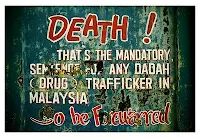The Government is looking into the possibility of withdrawing the mandatory death sentence for drug offences and replacing it with jail terms.
Minister in the Prime Minister's Department Datuk Seri Nazri Aziz said the Attorney-General's (A-G) Chambers would study the suitability of the move.
"One of the main reasons is because there are close to 250 Malaysians arrested as drug mules and sentenced to death abroad, including in China, Venezuela and Peru.
"It is difficult to justify our appeal to these countries not to hang them when our own country has the mandatory death sentence," he said in a press conference in Sauk, near here yesterday.
Convicted drug traffickers in the country now face the mandatory death sentence under Section 39B of the Dangerous Drugs Act.
Nazri, who is also the de facto Law Minister, said he would need to seek Prime Minister Datuk Seri Najib Tun Razak's view before discussing the suggestion with the A-G.
"If the Government is going ahead with the suggestion, we need to have a moratorium on death sentences from being carried out for those who are convicted in Malaysia.
"We are considering an alternative of 30 years' jails or more and allowing judges to have discretionary power under the Act," he said.
On the issue of porn blog duo Alvin Tan and Vivian Lee, Nazri said he would refer the matter to the A-G's Chambers.
"We need to look into what Malaysian laws they have broken. But also we need to remember that anything that is morally wrong does not necessarily mean that it is legally wrong.
"We definitely do not condone the act. This is what happens when there is absolute freedom of expression," he said.
Source: The Malaysia Star, October 21, 2012
Move humanises criminal law, say lawyers
The proposal to replace the mandatory death sentence for drug offences with imprisonment has been lauded by the legal fraternity.
Bar Council president Lim Chee Wee said the Bar Council had always been against the death penalty.
"If it is wrong to take someone's life, then the government should not do it either. It's ironic (to have such a law) and not correct," he said.
Lim said records had shown that despite having the death penalty, the number of drug trafficking offences had not been reduced.
"The numbers have instead increased. This shows that the death penalty has had a zero deterrent effect."
He said the council hailed the move as a historic moment for the criminal justice system in Malaysia as it represented a significant step in humanising criminal law.
Syariah lawyer Nizam Bashir was also in favour of abolishing the death penalty and believed it should be repealed for offences that were out of sync with the public conscience.
"The argument has been that no matter how good a system is, it will never be error-free," he said.
He said that in light of weaknesses in the legal system, innocent people could be found guilty of the offence and sentenced to death.
Nizam explained that when the sentence was first introduced in the country, it was to ensure that the law kept pace with changes in society.
"It was to show that Malaysia was serious about acting on drug offences by imposing the death penalty, given the harm caused by these drug traffickers and the number of lives they destroyed.
"Justice can be tempered with mercy and, where appropriate, offenders should be given a 2nd chance."
Source: New Straits Times, October 21, 2012
